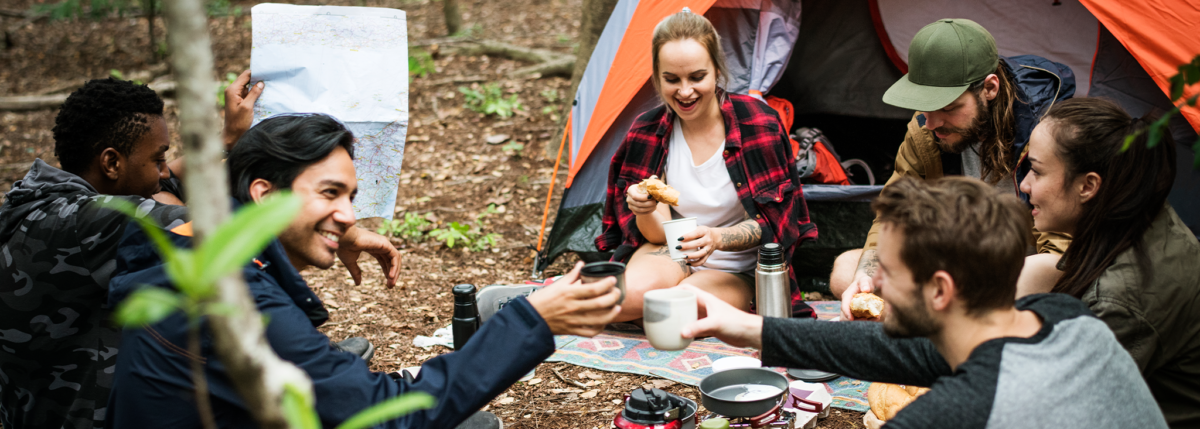T1D Camping Essentials
If you are traveling to the mountains, the lake, or the woods this summer, what activity could be more fun and freeing than pitching a tent and camping for a couple of nights with friends and family? Having type 1 diabetes can often feel less-than-freeing, but that shouldn’t mean that you can’t still join in on the adventure. You’ll just need to be prepared—as always! Depending on where you’re headed and how long you’ll be staying—here is an essential packing list of what you will need while camping with type 1 diabetes.
Hydration
It is extremely important to stay hydrated in the heat as well as during any sort of physical exertion! Dehydration can cause a spike in blood sugar levels. When the body is dehydrated, blood glucose becomes more concentrated due to the decrease in blood flow through the kidneys, making it much more difficult for the kidneys to remove any excess glucose from urine.
Water is always the best option to quench your thirst in any weather condition, but drinks such as non-caffeinated iced herbal teas and “sport” waters are effective as well. Drinks that act as diuretics or that contain a high caffeine or sodium content (coffee, alcohol, carbonated sodas/energy drinks, milk) can actually dehydrate you. So keep that in mind!
Heat
The affects of heat have been known to drop blood sugar levels when there is insulin working in the system, and in particular, when combined with exercise. Heat causes the body’s blood vessels to expand, which speeds up the insulin absorption rate. This can be made worse with vigorous walking, running or hiking due to the increased blood flow to certain areas, especially if insulin is injected into the legs. In addition, insulin and other supplies must be kept cool! If exposed to extreme heat for too long, insulin will become ineffective. The heat can also alter the effectiveness of supplies such as test strips and blood glucose (BG) meters.
Cold
Extreme cold can lead to illness if we are not properly insulated, so be sure to pack the proper clothing for the particular climate you will be in. Remember that drastic changes in body temperature can lead to inconsistent continuous glucose monitor (CGM) readings. Also beware of insulin’s exposure to frigid temperatures, as it could freeze. Devices such as pumps and CGMs should, in general, be kept under wraps and protected as much as possible.
Altitude
Ascending into high altitude areas is taxing on the body in many ways. As the altitude rises, the body has to work harder due to the decrease of oxygen levels. This could potentially lead to faster insulin absorption and hypoglycemia. More blood is pumped to vital organs such as the brain, heart and lungs, so the lack of blood flow to digestive organs can cause nausea and vomiting. Be sure to take breaks, snack and pace yourself as needed!
Other Dangers
Extreme weather (such as rain, thunderstorms, high winds, floods and wildfires) is important to prepare for. Pack your gear accordingly depending on the weather forecasts and any unexpected outcomes. Wildlife is a large aspect of camping! Keep all of your snacks, supplies and other baggage in a secure place and do not leave food out. Avoid bringing food that has a strong odor that could attract unwanted critters.
Packing List
Supplies
- Test Strips (bring extra!)
- BG Monitor (& a backup meter + batteries)
- Infusion Sets & Batteries (for pump)
- Insulin (long and short acting)
- Syringes/Insulin Pens
- CGM + Extra Sensors / Transmitters
- Nasal or auto-injectable glucagon
T1D Accessories
- Large backpack
- Cooler
- Waterproof travel pouches
- Frio cooling wallet
- Pump & CGM Clips or Pockets
- Medical Alert ID/Bracelet
Food & Hydration
- Water + Camelback/Hydration backpack
- Quick sugar: (Glucose tabs/gels, juice, shot bloks)
- Nuts/Nut butters (for protein!)
- Nutrition bars
Clothing (weather dependent!)
- Tanks/Tees
- Thermal gear
- All-weather jacket (NorthFace, etc)
- Wool sweaters
- Wool socks
- Gloves
- Hiking boots
Outdoor Gadgets & Tools
- First-aid Kit
- Walkie-talkies/Satellite device
- Compass
- GPS device
- Flashlights/Headlamp
- Fox Whistle
- Fire Starter Kit (or matches & lighter)
- Pocket knife or Multi-tool
Shelter
- Tent
- Sleeping bags
- Blankets
- Foil blankets
- Large garbage bags
- Towels
- Folding chairs





